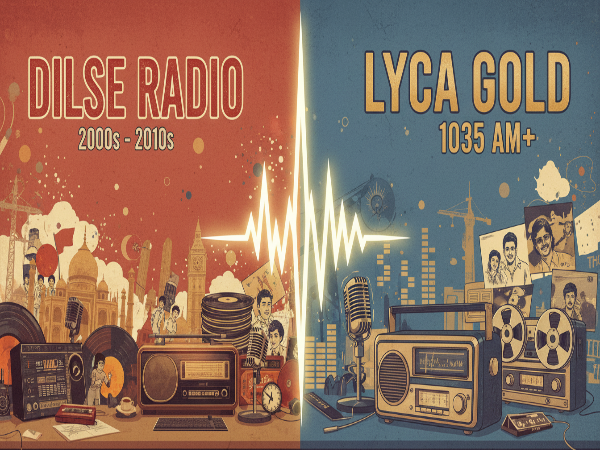Dilse Radio: From Cultural Bridge to Lyca Gold – The Evolution of a South Asian Broadcasting Icon
Exploring the Legacy, Transformation, and Impact of London’s Beloved Dilse Radio

Dilse Radio, once a cornerstone of London’s South Asian community, has journeyed from being a vibrant platform for music, talk shows, and cultural dialogue to becoming Lyca Gold 1035 AM in 2021. Its evolution reflects how communities, traditions, and broadcasting trends adapt to changing landscapes while preserving their roots. By understanding the history of Dilse Radio, its rebranding, and its continuing relevance as Lyca Gold, we gain insight into the resilience of diaspora media and the enduring importance of heritage-driven entertainment in the UK.
Introduction
Radio has always been more than just a medium for sound; it is a storyteller, a cultural preserver, and a bridge between generations. Among the UK’s many ethnic radio stations, Dilse Radio stands out as a shining example of how broadcasting can nurture identity while embracing change. From its early days as a speech-led station catering to London’s South Asian diaspora to its 2021 transformation into Lyca Gold 1035 AM, Dilse Radio’s story is one of adaptation, nostalgia, and community service. This article explores the station’s journey, the motives behind its rebranding, and its broader significance in Britain’s multicultural broadcasting landscape.
The Birth of Dilse Radio
When Dilse Radio launched under the umbrella of Lyca Media, it aimed to fill a gap in the UK radio market. The South Asian diaspora in London, numbering in the hundreds of thousands, needed a platform that offered more than just music. Dilse Radio provided a blend of talk shows, debates, news updates, and entertainment, focusing on everyday issues relevant to British Asians. Its name, meaning “from the heart” in Hindi and Urdu, captured its ethos: heartfelt content designed to resonate with its audience.
Programming That Connected Communities
One of Dilse Radio’s defining features was its rich variety of programming. The station hosted engaging talk shows discussing current affairs, health, finance, and social trends. It also aired interviews with community leaders, artists, and professionals, giving listeners access to knowledge and perspectives rarely found in mainstream outlets. Music remained central, featuring Bollywood hits, ghazals, and regional tracks that evoked memories of home. This balance between speech and melody turned Dilse Radio into a trusted cultural companion.
A Platform for Voices and Stories
Beyond entertainment, Dilse Radio offered a platform for underrepresented voices. Its presenters often invited callers to share opinions, creating a participatory environment where listeners felt valued. For first-generation migrants, the station was a lifeline to their heritage; for younger audiences, it offered a connection to their roots. By broadcasting in English, Hindi, Punjabi, and Urdu, Dilse Radio catered to a wide demographic, making cultural inclusivity its hallmark.
Challenges in a Changing Media Landscape
Despite its popularity, Dilse Radio faced challenges common to many niche broadcasters. The rise of digital streaming, podcasts, and on-demand platforms reshaped listening habits. Younger audiences gravitated toward Spotify playlists and YouTube channels, while advertisers sought platforms with broader reach. Maintaining a speech-heavy schedule also required significant resources, from hiring experienced hosts to producing high-quality discussions. As competition intensified, Dilse Radio needed to evolve to stay relevant.
The Decision to Rebrand
In 2021, Lyca Media assessed its portfolio to align with audience demands. Research showed an appetite among older South Asian listeners for classic Bollywood and retro Asian music. Recognizing this gap, the company decided to transform Dilse Radio into a station dedicated to nostalgia. This strategic pivot aimed to celebrate the golden era of South Asian music while simplifying the content mix for a targeted audience segment.
The Emergence of Lyca Gold 1035 AM
On September 13, 2021, Dilse Radio officially became Lyca Gold 1035 AM. The new brand positioned itself as “London’s first retro Asian music station.” Its playlists focused on hits from the 1950s through the 1990s, catering to listeners seeking melodies that shaped their youth. While the emphasis shifted to music, Lyca Gold retained elements of lifestyle programming, including shows on health, spirituality, and culture, maintaining a link to Dilse Radio’s roots.
Preserving the Legacy of Dilse Radio
The rebranding did not erase the station’s legacy. Instead, it reframed it. By honouring Dilse Radio’s spirit—its commitment to serving the diaspora—Lyca Gold offered continuity alongside change. Long-time listeners found comfort in hearing beloved presenters and familiar jingles, while new audiences discovered the richness of South Asian musical history. The station’s evolution became an example of how heritage media can modernize without abandoning its essence.
Audience Reception and Growth
Following the rebrand, Lyca Gold attracted a loyal fan base. Many appreciated its focus on golden classics, a niche underserved by other broadcasters. Listening figures showed growth in both reach and engagement, proving that carefully curated content can thrive even in a crowded market. The station’s presenters, often seasoned broadcasters, added warmth and authenticity, strengthening the emotional bond with listeners.
The Role of Radio in Diaspora Identity
Dilse Radio’s journey underscores the importance of radio as a cultural anchor for immigrant communities. For the South Asian diaspora in Britain, radio stations like Dilse and its successor Lyca Gold are more than entertainment providers—they are keepers of memory, language, and tradition. By broadcasting familiar music and addressing community issues, they sustain identity across generations, helping migrants feel at home while living abroad.
Regulatory and Industry Context
The UK radio industry operates under Ofcom regulations, requiring stations to maintain their licensed formats. Dilse Radio’s shift to Lyca Gold involved official approval, demonstrating the careful planning behind such transformations. The change also reflected broader trends: niche stations are increasingly segmenting audiences, tailoring content to age, taste, or heritage. Lyca Media’s strategy to operate both Lyca Radio (contemporary hits) and Lyca Gold (retro) exemplifies this approach.
Technology and Digital Expansion
In an era of smart speakers, mobile apps, and web streaming, radio’s reach extends far beyond traditional AM frequencies. Lyca Gold embraced technology by offering online listening, mobile applications, and “listen again” services. This digital presence ensures that the station’s content remains accessible worldwide, giving the South Asian diaspora an easy way to stay connected regardless of geography.
Comparing Dilse Radio with Other Stations
Dilse Radio was unique, but it operated within a competitive landscape that includes Sunrise Radio, Panjab Radio, and other ethnic broadcasters. Unlike its peers, Dilse Radio invested heavily in talk-based content before its rebranding. Its transition to Lyca Gold allowed it to specialize, while others continued broader formats. This differentiation helped Lyca Gold carve out a distinct market position.
Cultural Impact and Social Responsibility
Throughout its existence, Dilse Radio engaged with community causes. From supporting health awareness campaigns to hosting charity drives, the station used its platform to foster social good. Lyca Gold continues this tradition, partnering with local organizations to address issues affecting South Asians in the UK. This sense of responsibility strengthens its reputation as more than a commercial broadcaster.
Lessons from the Evolution of Dilse Radio
The story of Dilse Radio teaches valuable lessons about adaptability. Successful media outlets listen to their audiences, understand shifting trends, and evolve while honouring their origins. By embracing nostalgia and focusing on a clear demographic, Lyca Gold has ensured sustainability without alienating those who cherished Dilse’s original mission.
Future Prospects
Looking ahead, Lyca Gold is well positioned to expand its influence. Continued investment in digital tools, curated playlists, and interactive shows could attract younger listeners interested in exploring the classics. Collaborations with artists and cultural institutions might further elevate its profile, cementing its place as a guardian of South Asian musical heritage in Britain.
Conclusion
Dilse Radio’s transformation into Lyca Gold is not simply a rebrand; it is a testament to the resilience of community broadcasting. From talk shows and cultural debates to the timeless charm of retro Bollywood, the station’s journey mirrors the evolution of the South Asian diaspora itself. By preserving memory while embracing innovation, Dilse Radio—now Lyca Gold—remains a beacon of connection, identity, and joy in the UK’s diverse media landscape.



